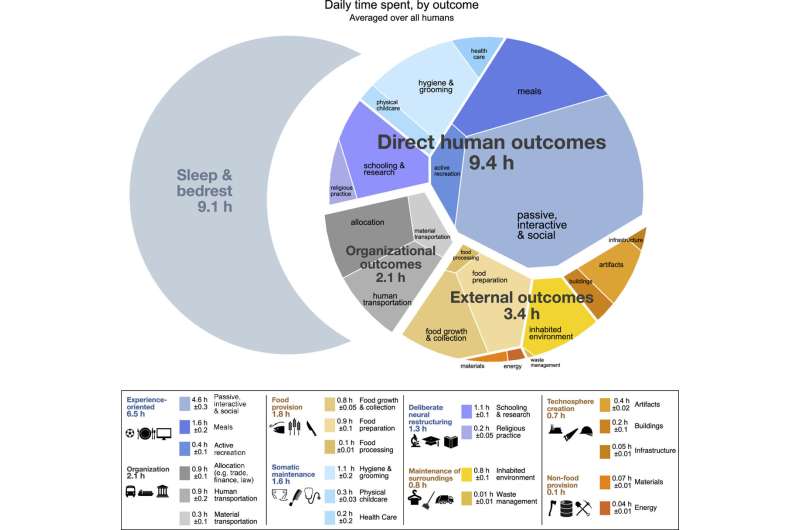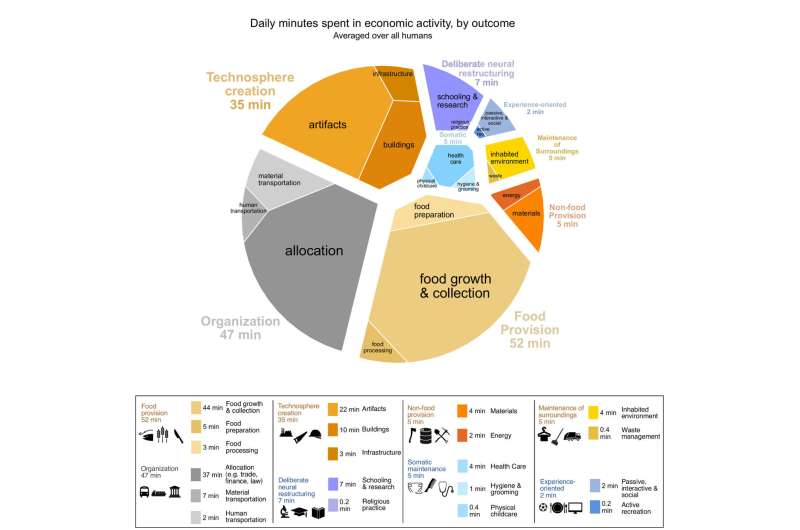This article has been reviewed according to Science X's editorial process and policies. Editors have highlighted the following attributes while ensuring the content's credibility:
fact-checked
peer-reviewed publication
reputable news agency
proofread
Sleep, cleaning, fun: Research reveals the average human's day worldwide

How do you spend each day? Researchers sought answers to that basic question from people of various ages living around the world. They report that on an average day, people spend more than a third of their time focused on matters of health, happiness and keeping up appearances.
"We found that the single largest chunk of time is really focused on humans ourselves, a little more than 9 hours," explained study author Eric Galbraith, of McGill University in Montreal, Canada.
"Most of this—about 6.5 hours—is doing things that we enjoy, like hanging out, watching TV, socializing and doing sports," he said. Reading and gaming also fall within this rubric.
The other 2.5 hours (out of the 9) are spent on hygiene, grooming and taking care of our own health and that of our kids, said Galbraith, a professor in the department of earth and planetary sciences.
Sleep and bedrest occupy the next largest chunk of time: more than 9 hours on average.
That sounds like a lot of shut-eye, but Galbraith stressed this number reflects the average across the full age span, so it includes kids who might sleep up to 11 hours a day. "It also includes time in bed and not sleeping, which can be as much as one hour per day," he said.
Among adults, Galbraith said, the data from wearable watches points to a lower daily figure, roughly 7.5 hours a day.
The remaining minutes? They seem to go toward getting organized, moving about or producing, creating and maintaining things and spaces.
To see what roughly 8 billion people do day-in and day-out, investigators analyzed time use surveys from 58 countries, which account for about 60% of the total global population.
They also assessed economic activity information gleaned from an online statistic repository managed by the International Labour Organization (ILO), alongside country-specific data compiled by Canada, China, Japan and Russia. In sum, economic data was available for 139 countries representing 86% of the world's population.
Child-specific information—covering kids through age 17—was also included in the analysis, mostly based on data obtained from UNICEF, the World Bank, and the Organization for Economic Co-operation and Development.

About 3.4 hours each day appears to be focused on simply making, cultivating and taking care of stuff, the team found. That refers to time spent obtaining natural resources such as food, as well as time spent building, manufacturing, cleaning and handling waste.
But those hours are definitely not divided up equally, Galbraith observed.
For example, he noted that while 45 minutes out of every day is spent "tidying and maintaining our dwellings," only about 15 minutes a day appears to go toward infrastructure and building construction, while just a single minute a day is spent dealing with garbage disposal.
Food prep eats up just five minutes daily, on average, while food provision claims 52 minutes a day.
Lastly, a bit more than two hours out of every day goes to transporting ourselves (and our things) from one place to another and organizing.
The latter, explained Galbraith, includes legal matters and time spent trading, financing, selling, governing, developing and implanting policy. Taken together, that activity averages out to just about an hour out of each individual's day; transportation takes up the other hour.
But what about time spent working?
Globally, "economic activity is dominated by agriculture and livestock production, followed by 'allocational activities'—trade, finance, sales, law, governance and policing—and manufacturing," Galbraith noted. Such work activities fall within already delineated time categories.
Still, the analysis did tease out the average number of hours people spend participating in the entire global economy: 2.6 hours per day. This number seems small because it's the average of all humans; it works out to 41 hours per week for all working adults worldwide.
You might expect that cultural and economic differences have a big impact on the way people spend their time in different countries? Galbraith believes that they do and don't.
"There are some things that vary a lot based on income and cultural differences," he acknowledged. "For example, people in poor countries spend a lot of time farming, unlike in wealthy countries. And there are big cultural differences in things like the time spent preparing food, from half an hour to almost three times that much.
"But for a lot of things—like how much time people spend moving from place to place—there is very little difference between countries," Galbraith noted.
The findings appear in the journal PNAS.
More information: William Fajzel et al, The global human day, Proceedings of the National Academy of Sciences (2023). DOI: 10.1073/pnas.2219564120
There's more on how people use their time at Our World In Data.
Journal information: Proceedings of the National Academy of Sciences
Copyright © 2023 HealthDay. All rights reserved.



















